Best Language Learning Apps for Travel
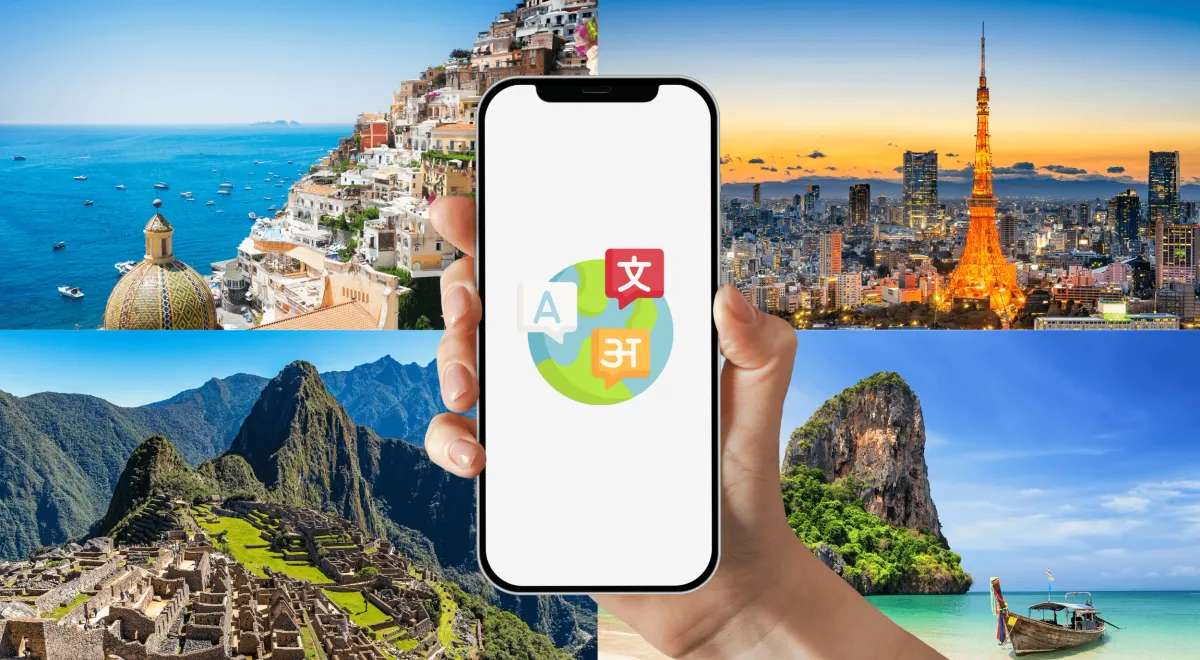
Living in Tokyo, I know the difference that learning a language can make as an international traveler and a digital nomad. I also know that not all language-learning apps are made equally.
I’ve loved learning languages since studying French in school, back when the concept of using an app to learn languages didn't even exist. Today couldn’t be more different. There are so many language apps on the market, each catering to a different niche or style of learning.
In this list of the best language apps for travel, I’ll break down the top options for international travelers, remote workers, and digital nomads who are always on the move and looking to learn the language of their next travel destination.
1. Duolingo: Best for Gamified Language Learning
Who hasn’t tried Duolingo before? I’ve had my account for over 10 years and accumulated more than 35,000 gems - how’s that for a subtle flex? This app has perfected gamified language learning with addictive streaks, fun characters, and let’s be honest, a terrifying mascot.
Cost: Free, or you can upgrade to Duolingo Super for $12.99/month

2. Babbel: Great for Learning Actually Useful Phrases
It’s hard to go a day without hearing an ad for Babbel from your favorite influencer or in the middle of a podcast, but is the app any good? I’d say yes. Where most language apps choose a fun aesthetic, Babbel opts for a clean and professional look that teaches you genuinely useful phrases to survive daily life abroad.
Cost: $13.95/month or upgrade to Babbel Live for $99/month

3. Rosetta Stone: Best for Researched Backed Learning
Rosetta Stone uses an immersive style of learning that doesn’t give you many (sometimes any) explanations, but, if you work through the entire program, you’re guaranteed a high level of language comprehension - in other words, it’s a trust-the-process sort of app.
Cost: One-language course is $47.97/3-months and $126.00/year, or get the unlimited languages lifetime subscription for $199.00

4. Lingopie: Best for Leaning in Your Free Time
Lingopie is one of those apps that has you asking how no one has thought of this before! It improves your language learning by placing subtitles on real TV shows with the ability to toggle your native language on and off. Don’t understand a phrase? Just click it to get an explanation and have the words automatically added to your flashcards.
Cost: $36/3-months or $71.88/year. There are also frequent sales - I got a lifetime subscription in the Summer Sale for $199

5. Preply: Best for Flexible 1-on-1 Tutoring
Sometimes, you just want a real person to explain things to you, and that’s where Preply shines. It’s not a course or an app in the traditional sense, but a giant marketplace of over 100,000 tutors across 180+ countries. You can filter by price, availability, accent, even hobbies (yes, really), and book private lessons that fit your schedule.
Cost: Depends on the tutor, but most start around $10–$15/hour. Some are even cheaper.
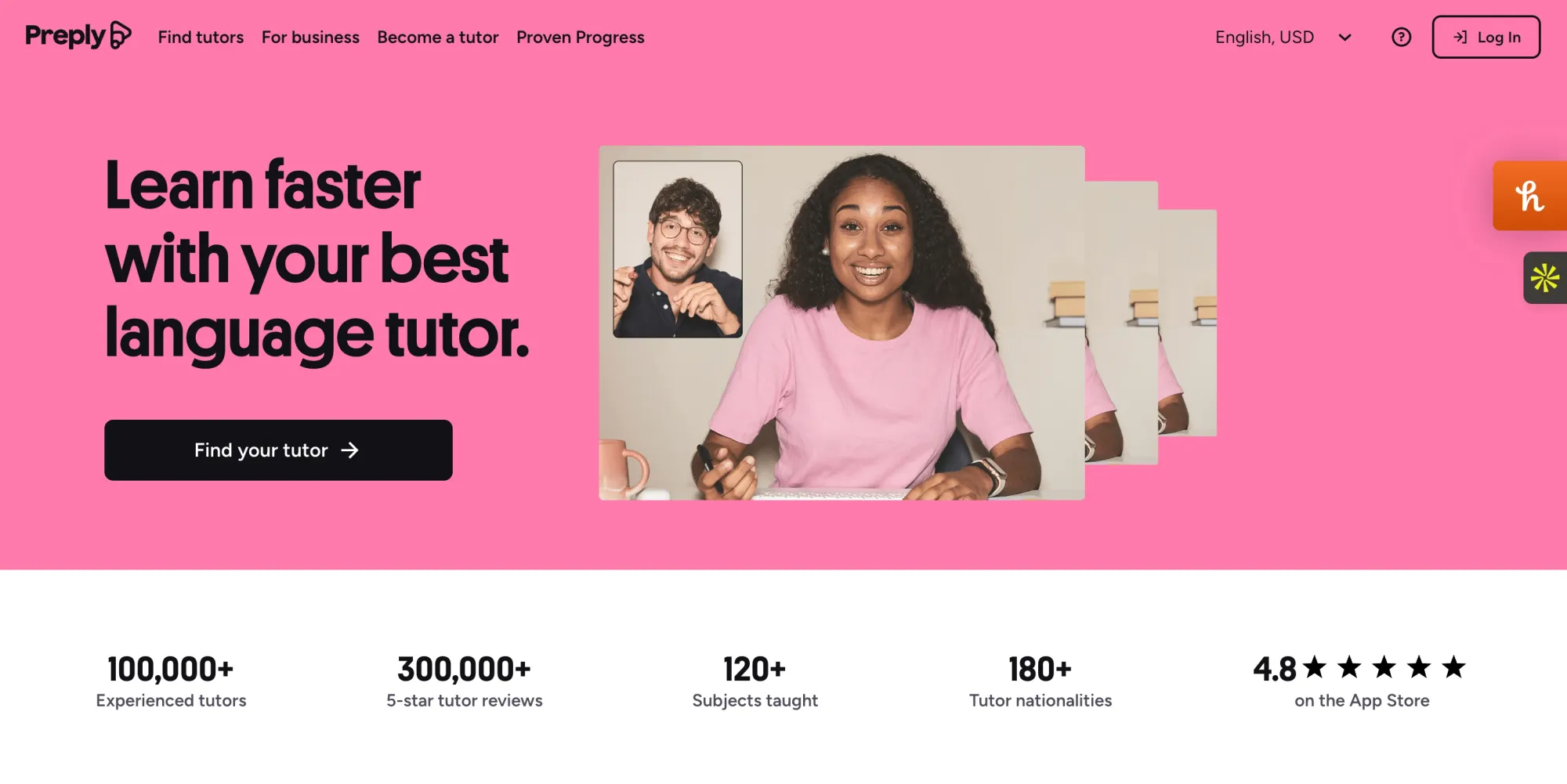
6. Lingoda: Best for Live Classes
Want to enroll in a language school-like platform without committing to a specific time or place? Then you might want to check out Lingoda. With them, you can book live classes ad-hoc at times that work for you using monthly group or private class credits. Lingoda follows the Common European Framework of Reference (CEFR), an internationally recognized standard that takes you from beginner to total fluency.
Cost: Plans from 5 group classes for $79.99/month
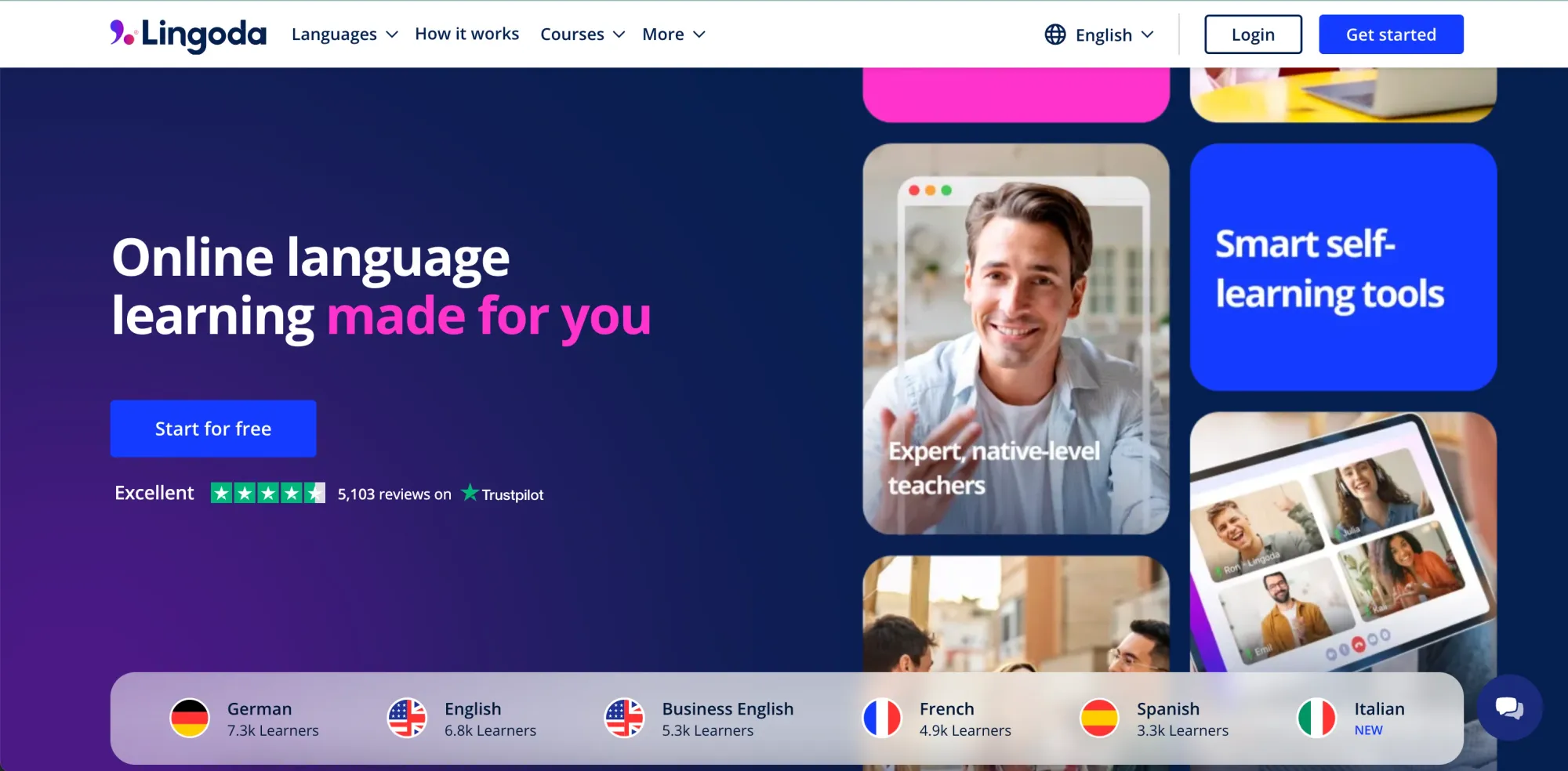
7. Pimsleur: Great for Dedicated Study Time
Pimsleur is unique in the way it teaches you: instead of focusing on quick vocab lessons, you’ll work through full classes led by a ‘teacher’. Using a listen-and-repeat method, Pimsleur plays a short conversation and then breaks it down word by word. The goal is to get you comfortable speaking out loud - a serious confidence builder.
Cost: $19.99/month for one language, $20.95/month for all 51 languages, or buy individual language levels (that’s 30 total lessons) for $150.00

8. Promova: Best for AI-Powered Speaking Practice
If you want to actually speak the language instead of just memorizing words, the Promova app is another smart choice. Alongside short lessons and live classes, its AI Tutor lets you practice real conversations 24/7 through voice calls. You’ll get instant feedback, improve pronunciation, and build confidence to chat naturally on your next trip.
Cost: 77.99$ per 12 lessons or just 6.49$ per lesson
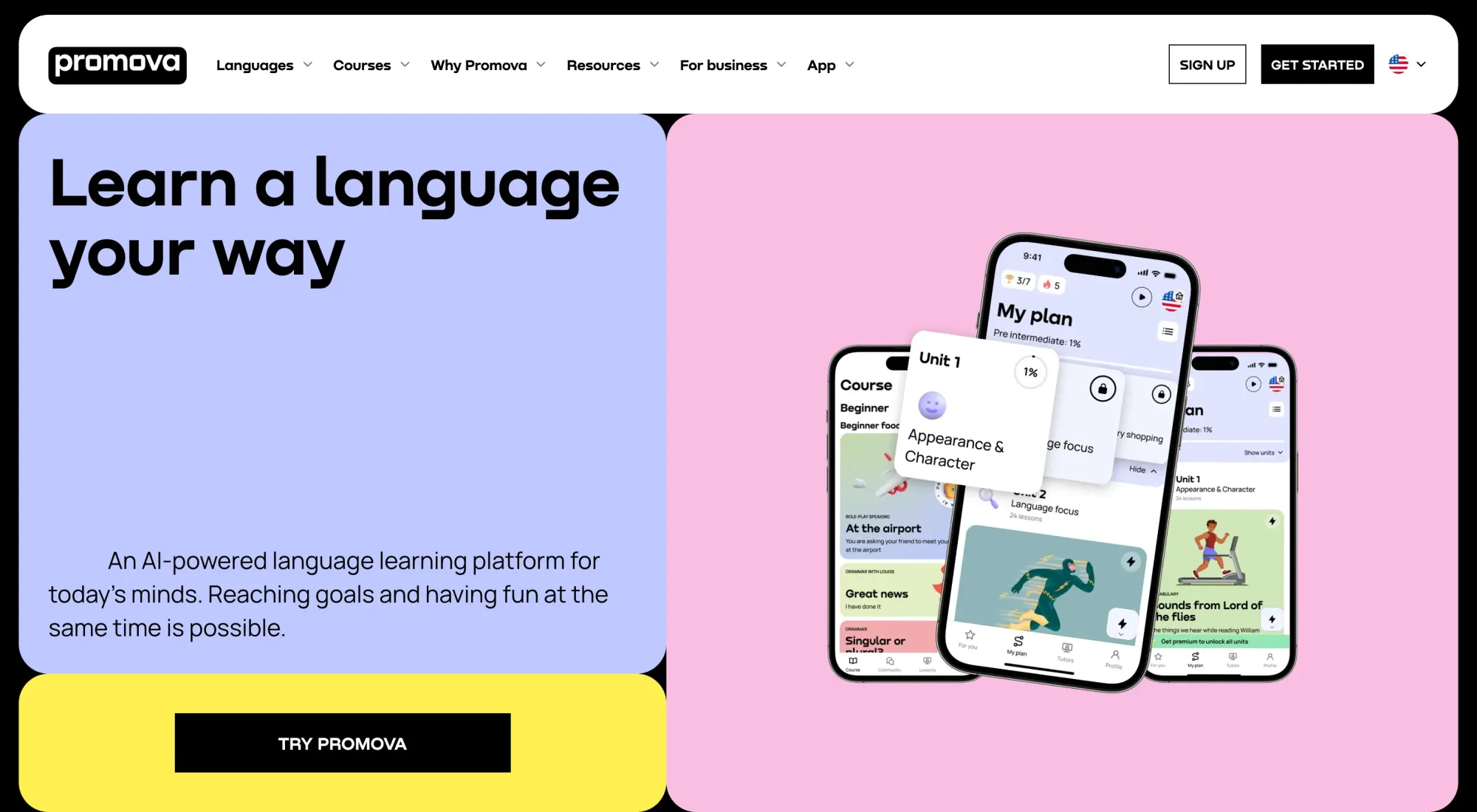
9. Drops: Best for Quick Daily Study
If your goal is to increase your vocab, then Drops is for you. It’s essentially upgraded flashcards with great UX design that makes you want to keep going. Granted, it won’t teach you much grammar, but Drops is ideal if you’ve already got some language basics.
Cost: Free for five minutes a day or $13.00/month

10. Busuu: Best for Conversational Language Learning
I’m a big fan of Busuu. In my opinion, it’s the best language app for learning how to hold a conversation in another language. When I travel, I usually don’t need to learn every tense and irregular verb, I just want to be able to connect with local people and Busuu is all about this!
Cost: Premium is $10.50/month or $62.99/year (saving you 25%)

11. Memrise: Best for Memorization on the Go
For me, the most helpful thing about Memrise is the videos of native speakers that go with every single question. Hearing a variety of accents is challenging - I swear the South of France speaks a different language - but will ultimately make you a better language speaker.
Cost: Premium is $22.99/month or get a lifetime membership for $137.49

12. italki: Best for 1-On-1 Classes
One of the few negatives of life as a digital nomad is that it’s tricky to commit to classes. That’s where italki comes in! It’s an online teaching platform for finding language teachers to purchase lessons from directly. It doesn’t have courses or vocab games but will give you the chance to practice speaking a language in real-time.
Cost: Between $4 and $80 per lesson

13. Mosalingua: Built for Flash Card Lovers
Flashcards might not be the most exciting language-learning tool, but they are a tried and true method that works. Mosalingua is my pick of the flashcard apps for its spaced repetition science and personalization - you can add cards, record your own voice, and increase the number of cards studied at a time.
Cost: $9.49/month and $59.90/year

14. Beelinguapp: Best for Reading Junkies
Hands up if you’re addicted to your e-reader and always reading something. Me too, and trust me when I say, Beelinguapp is our perfect app. You can choose from their giant library of fiction, non-fiction, and news texts and read in your new language and mother tongue simultaneously. My dream has always been to demolish books in French as fast as I can in English, and this app is helping me to get one step closer.
Cost: You can read and listen for free or pay $6.99/month to unlock all stories and go ad-free

Other FREE Useful Apps and Resources to Learn a Language
- Duolingo French and Spanish Podcasts: 20-minute stories told in English intermixed with French/Spanish
- Word Reference: My favorite online dictionary for checking translations
- ChatGPT: Did you know you can use AI to translate full sentences?
- Nemo Language Apps: Online phrasebooks with 100 of the most useful phrases in 40+ languages
- Anki: A flashcard program to make your own flashcards to use on the go
What Key Features Should I Look for in a Travel Language App?
When I started language learning as a hobby almost a decade ago, there were slim pickings for apps or websites...so I took what I could get - helpful or not.
Now, there are numerous travel language apps to try out and choose from. Since becoming a digital nomad, these are the three features I always look for in a learning language app:
- Gamification: I need to want to be on the app or I won’t ever open it
- Offline Access: Traveling often means limited wifi and data
- Cultural Depth: I look for apps that expand on my understanding of a destination
Ready to Try a Language App from Our Top Picks?
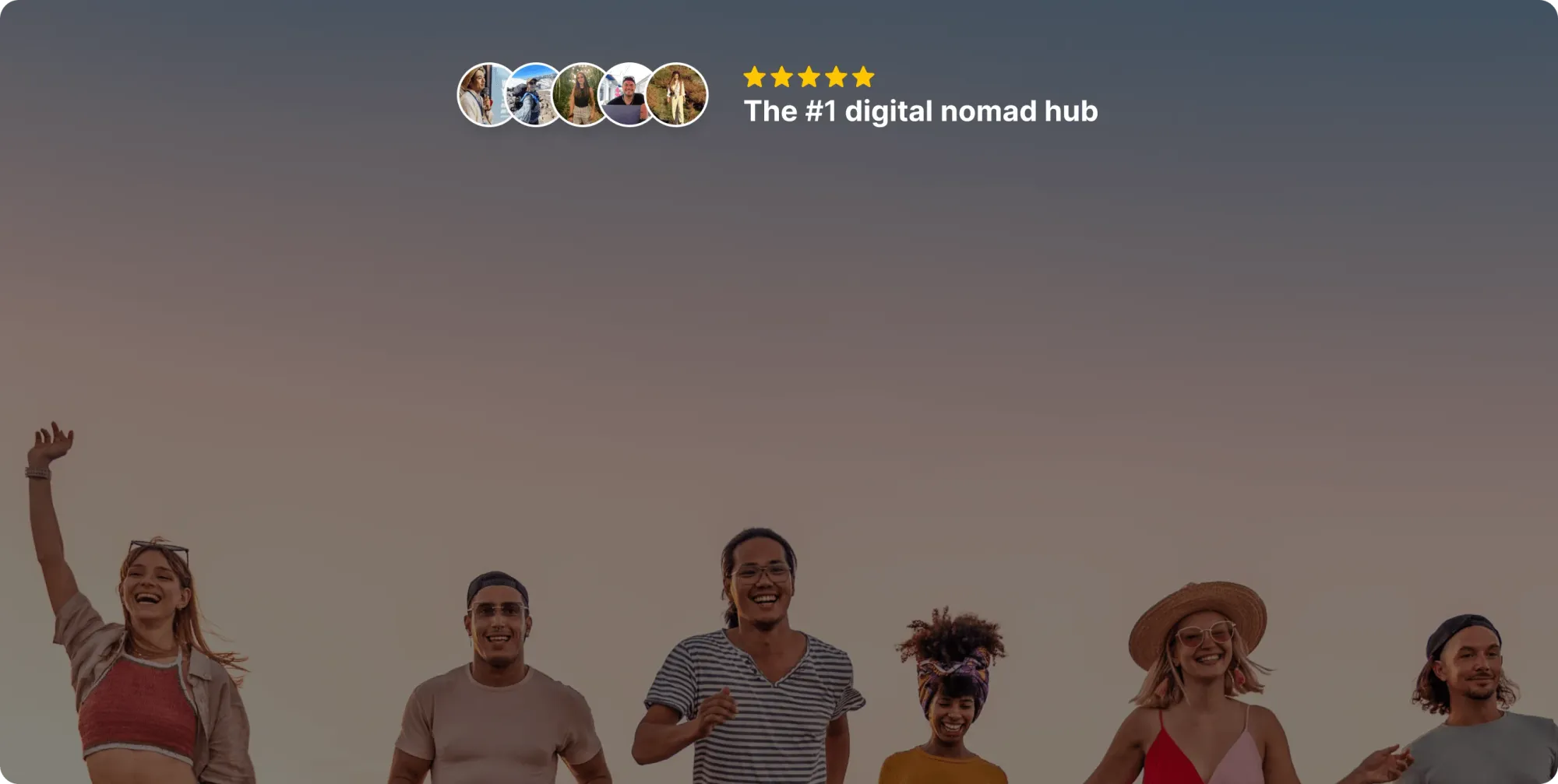
Join our global
digital nomad community
Join us for free
Freaking Nomads is supported by you. Clicking through our links may earn us a small affiliate commission, and that's what allows us to keep producing free, helpful content. Learn more




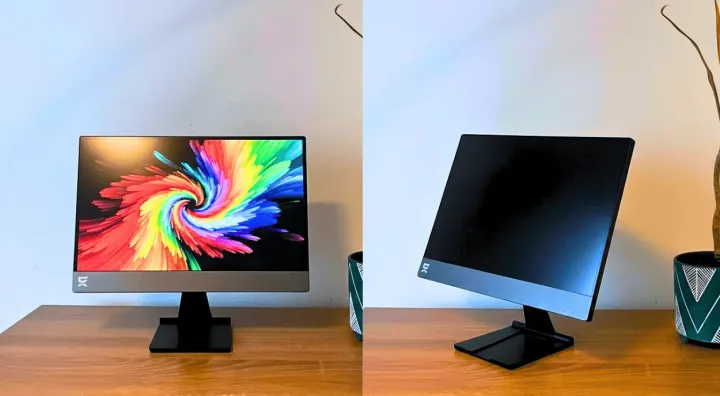
 Travel tips, hacks, and news
Travel tips, hacks, and news Exclusive travel discounts
Exclusive travel discounts Offers and promotions
Offers and promotions Digital nomad inspiration
Digital nomad inspiration Latest articles form our blog
Latest articles form our blog